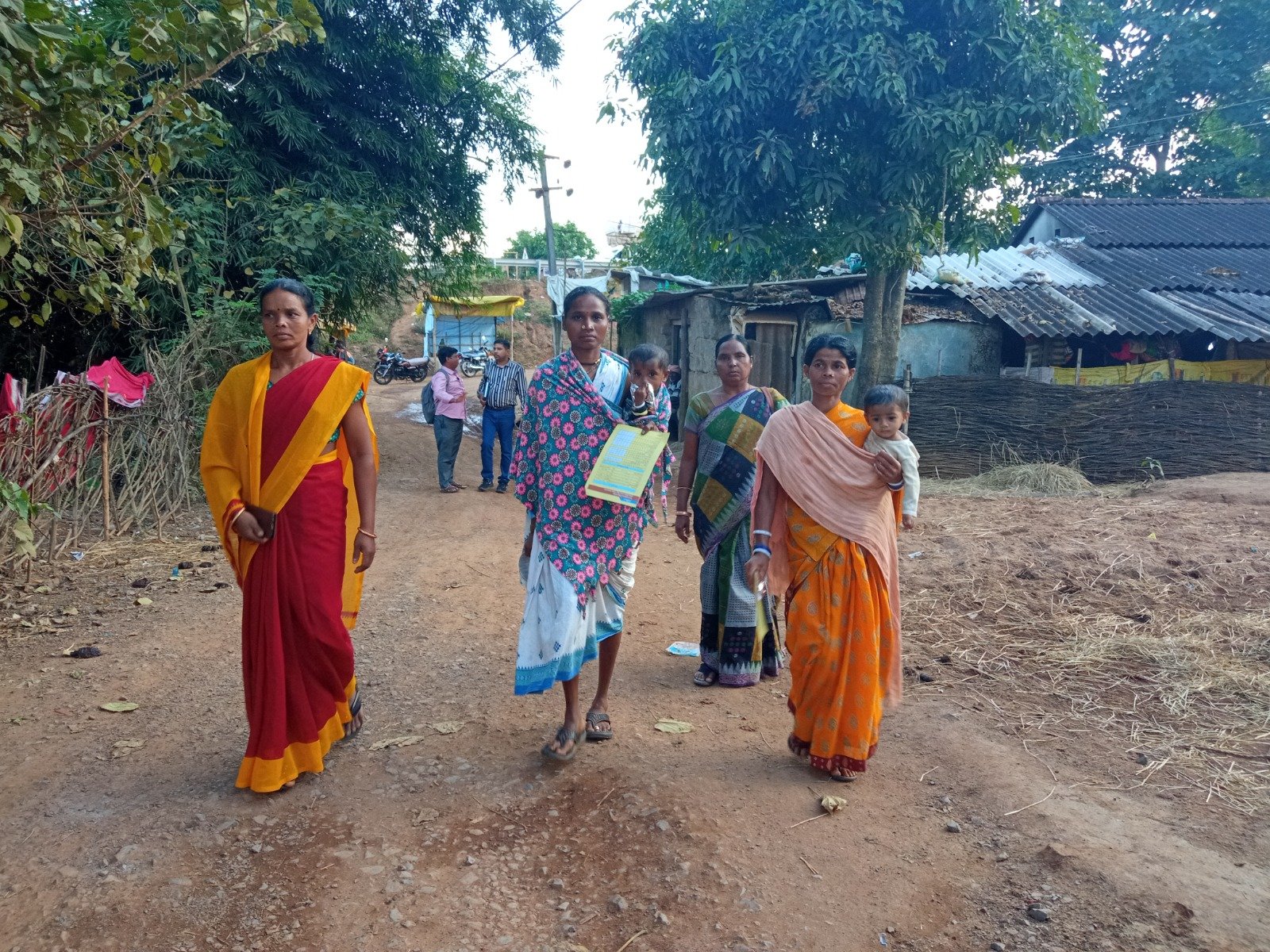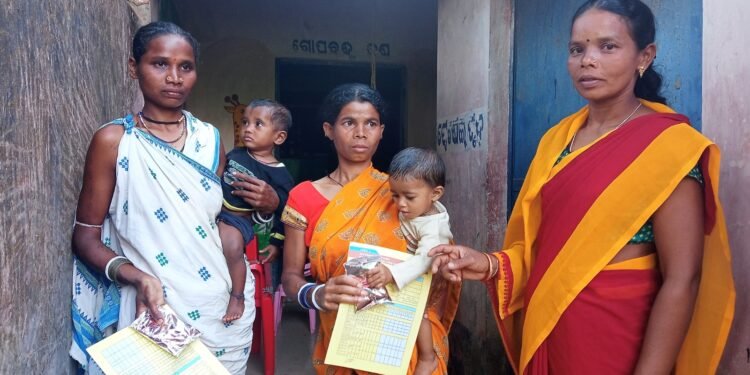by Sarada Lahangir
Bhubaneswar- Imagine the youngest children, needing nourishment, or lactating mothers, their bodies weary from childbirth, arriving at the familiar, welcoming doorstep of their local Anganwadi Centre. For generations, this place has symbolized direct care and unconditional nourishment, a simple assurance of sustenance.But now, a chilling transformation is underway. Instead of the warm hand of a community worker, they are increasingly met by a cold, unyielding digital gaze, demanding authentication from a smartphone screen. This isn’t just about efficiency; it’s about forcing India’s most vulnerable to navigate complex technology for the very food that sustains them. This unprecedented digital gatekeeping threatens to deny essential sustenance, turning a fundamental right into a precarious privilege
This is the stark reality emerging from the Ministry of Women and Child Development (MWCD)’s new and highly controversial mandate: facial recognition authentication for accessing vital nutrition under the Supplementary Nutrition Programme (SNP).
Today, the Right to Food Campaign sharply condemned this policy, calling for its immediate end, arguing it’s a grave violation of the right to food and human dignity, threatening to cut off millions of vulnerable women and children from vital nutrition.
The contentious new mandate involves a two-step verification process: requiring both facial recognition of beneficiaries—children aged 6 months to 3 years, pregnant, and lactating women—and an OTP verification via Aadhaar-linked mobile numbers. Adding to the pressure, reports indicate that states were warned they would be denied revised nutrition cost norms if they failed to implement this by March 25, as per a Ministry letter dated March 5, 2025. A subsequent directive on May 30, 2025, further mandated biometric attendance with ‘liveness’ detection for children aged 3-6 years receiving hot cooked meals at Anganwadi Centres (AWCs). The latest blow came on June 30, when Anganwadi workers nationwide were abruptly told to reinstall the POSHAN Tracker app, now devoid of the option to bypass facial recognition. “This move not only undermines access to food for India’s most vulnerable populations but also turns Anganwadi workers into enforcers of a system that is both unjust and unworkable,” stated the Right to Food Campaign. They emphasize that this policy directly violates the National Food Security Act (NFSA) 2013, which guarantees universal SNP access for pregnant and lactating women and children under six.
The latest blow came on June 30, when Anganwadi workers nationwide were abruptly told to reinstall the POSHAN Tracker app, now devoid of the option to bypass facial recognition. “This move not only undermines access to food for India’s most vulnerable populations but also turns Anganwadi workers into enforcers of a system that is both unjust and unworkable,” stated the Right to Food Campaign. They emphasize that this policy directly violates the National Food Security Act (NFSA) 2013, which guarantees universal SNP access for pregnant and lactating women and children under six.
“Government Lacks Trust in Its Own People” Says Right to Food Convenor
Sameet Panda, National Convenor of the Right to Food Campaign, didn’t hold back in his criticism of the mandatory facial recognition. “Imposing this technology shows that the government does not have trust in its grassroots functionaries like Anganwadi workers, nor in the beneficiaries who are availing their entitlements,” Panda asserted. He pointed out the significant practical hurdles, explaining, “This technology depends on multiple factors like women’s access to mobile, the network of the area, technical glitches due to poor network will deprive the beneficiaries of availing their entitlement.”
This controversial decision comes at a critical time when malnutrition remains a severe issue in India. According to the National Family Health Survey (NFHS-5), 35.5% of children under 5 years of age in India are stunted, 19% are wasted, and 36% are underweight. Odisha, is also faces similar grim statistics, with 31.0% of children under five being stunted, 18.1% wasted, and 29.7% underweight. Alarmingly, 64% of children aged 6-59 months and 64% of women in India suffer from anemia.

Digital Divide Threatens Universal Access to Nutrition
The Integrated Child Development Services (ICDS), India’s flagship program to combat malnutrition, serves a massive 70 million beneficiaries through 1.4 million Anganwadi Centres. All ICDS services, including supplementary nutrition, are meant to be universal and unconditional, as repeatedly affirmed by Supreme Court orders in the ‘Right to Food case’ (PUCL vs Union of India & Ors., CWP 196/2001) and the NFSA. This means simple presence at an Anganwadi centre should be enough to receive benefits.
However, the facial recognition mandate transforms this fundamental right into a conditional privilege, dependent on access to smartphones, internet connectivity, functional apps, and correctly Aadhaar-linked numbers—resources often out of reach for the most marginalized families.
Data from NFHS-5 for Odisha starkly highlights this digital divide: only half of women own and use a mobile phone, and among those, only 68% can read SMS messages. There’s a significant gap between urban (59%) and rural (48%) women in mobile phone ownership. Furthermore, a mere 33% of Scheduled Tribe women own and use a mobile phone, compared to 46-68% from other caste/tribe groups. Scheduled Tribe women with phones are also less likely to read SMS messages (53%) than their counterparts (61-79%).
Compounding these issues, as many as 2,603 villages in Odisha still lack mobile network services, according to data presented in the Odisha Legislative Assembly in March 2025. With 51,176 villages in the state, this means a significant portion of the population remains unconnected. In such a scenario, the Campaign asserts, “it is unconscionable that access to food is being made conditional upon flawed technology.
Why the Mandate NeedsWithdrawal: Four Key Reasons
The Right to Food Campaign insists the mandate must be withdrawn for several critical reasons:
- Mass Exclusion by Design: Many beneficiaries, particularly women in rural and tribal areas, lack personal phones or Aadhaar-linked numbers. Issues like shared or outdated numbers, patchy networks, failed scans, and server problems will lead to widespread denial of essential entitlements. This will disproportionately affect the poorest women and children, including migrants without local address proof.
- Illegal and Unconstitutional: The mandate directly defies Supreme Court directives in the Right to Food case and Sections 4 and 5 of the NFSA, which guarantee universal, unconditional access to nutrition for children and women.
- Anganwadi Workers Overburdened : Workers are being forced to use their personal phones without compensation, spending excessive time (up to 30 minutes per beneficiary) battling repeated authentication failures, often under threat of disciplinary action.
- No Evidence of Reduced Leakages: Despite government claims of transparency and efficiency, there is no public evidence that facial recognition has reduced corruption. Instead, it has introduced new avenues for exclusion, fraud, and potential data misuse.
Right to Food Campaign Demands
The Right to Food Campaign, a network of individuals and organizations committed to the realization of the right to food in India, has clear demands:
- Immediate withdrawal of the order mandating FRS for nutrition access.
- Ensure universal access to Take-Home Rations and other ICDS services without any biometric or Aadhaar-based conditionalities.
- Provide adequate infrastructure and digital support for Anganwadi workers, including high-quality smartphones, data plans, or computers with internet access.
- Publicly release data on exclusions from pilot projects to assess the real impact of FRS implementation.
In light of the widespread reports of exclusion, technical failures, and the fundamental breach of rights, the Right to Food Campaign maintains that this facial recognition mandate is not merely impractical but also morally reprehensible and legally unsound. The Campaign, therefore, demands its immediate and complete withdrawal, resolute in its commitment to upholding the universal, dignified, and non-discriminatory right to nutrition for all beneficiaries under the Supplementary Nutrition Scheme.






